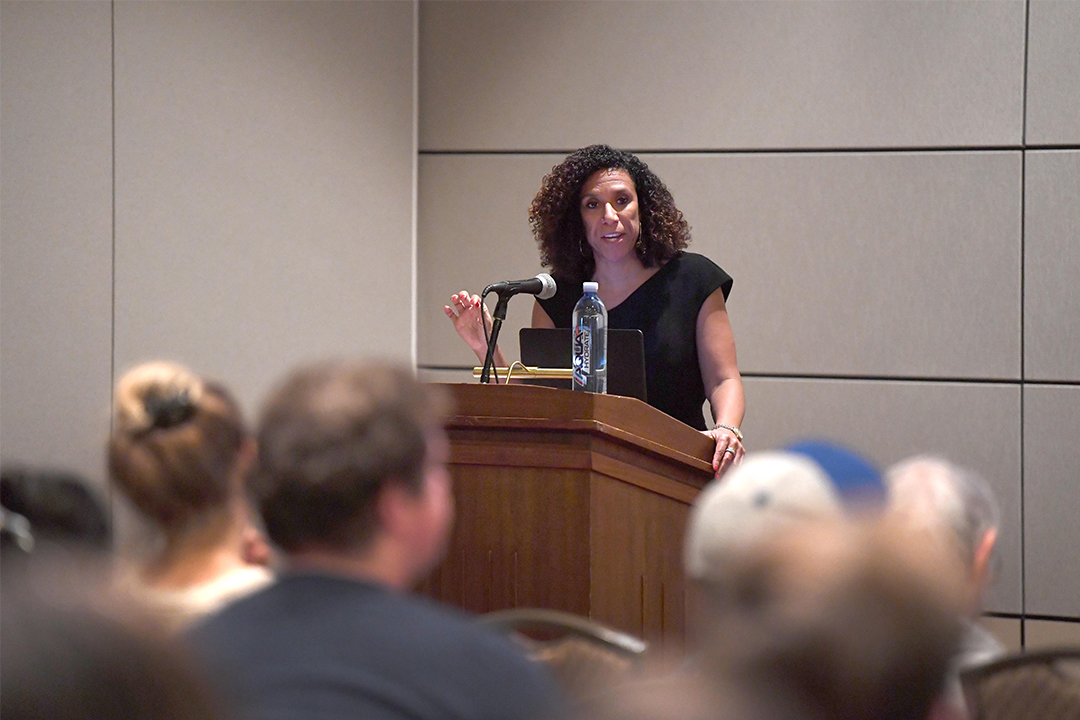A self-described “performance race scholar,” Professor of English Ayanna Thompson has written extensively on modern interpretations of Shakespearean dramas, particularly the casting of people of color in roles originally imagined for white actors. From Latino Othellos to African Macbeths, it’s become a common practice in theaters like the Folger in Washington and the Globe in London as well as high school stages across the world. And for Thompson, who is lecturing at campuses throughout the country this year as a Phi Beta Kappa Visiting Scholar, each reimagined performance presents a new showcase to talk about race.
“Shakespeare is my secret weapon. Communities are hungry to have safe dialogues around race and Shakespeare is a nice on-ramp,” she said. “For me, Shakespeare isn’t the destination; it’s the vehicle to engage us in these harder conversations.”
As a Phi Beta Kappa scholar, Thompson spends 48 hours on campuses, presenting public lectures, guest-teaching classes in disciplines like English and African American studies and meeting with students, faculty and administrators. Adapting her lectures from the classes she teaches at GW, Thompson says she often astounds listeners with two simple statements: First, modern Shakespeare is intertwined with race. And second, nobody is certain if audiences even notice. “Little research has been conducted on the effects of perceptions of race on the reception of classical performances,” she said. “My talk aims to challenge our scholarly understandings of audience responses to nontraditional casting.”
People of color have performed Shakespeare for centuries—at least as far back as the African Grove Theatre founded by free blacks in New York City in 1821. Reimagined Shakespeare works have garnered critical and box office acclaim, such as Orson Welles’ 1936 stage version of Macbeth set in the Caribbean and featuring actors of color. In 2009, British director Peter Sellars’ Othello stoked controversy by casting a Latino actor as the title Moor.
To Thompson, it is impossible to ignore race in Shakespeare performances. “It's always there, it’s always present, it always impacts the way Shakespeare is being employed," she said. Indeed, applying some form of diversity to Shakespeare is so common that many refer to it as “the new traditional casting.”
Still, according to Thompson, scholars, artists and theater-goers alike have been reluctant to address questions about race in theater. Many assume that audiences don’t see race—favoring so-called “blind casting” where an actor’s color or gender bears no significance to the play itself. But with some productions clearly making a conceptual casting statement—like a recent version of Macbeth at D.C.’s Shakespeare Theater set in contemporary Africa with overtones of Qaddafi's Libya—Thompson says theaters too often “play fast and loose” with audience expectations. “Do you want them to notice race or don’t you?” she said.
In reality, she said, there is little reason to believe that racial assumptions don’t impact audience perceptions. “The running narrative you hear is that audiences have gotten used to seeing diverse casts and that it’s not an issue any more,” Thompson explained. “But the truth is that we have 150 years of actors of color performing Shakespeare and we have zero data about how audiences react to it. And, even within the theater world, nobody wants to ignite that tricky and difficult discussion around race.”
At both her English classes at GW and her Phi Beta Kappa lectures, students are often energized by the notion of doing original research on a historical master. “They think that everything about Shakespeare has already been asked and answered. But I tell them that, in fact, there’s a big gaping hole to fill—and their generation has the tools to fill it,” she said. Students have approached her with ideas for audience-surveying apps and collaborative projects among experimental psychologists, political scientists and English majors. “We have 400 years of Shakespeare performance history and we are now in a moment when we are asking brand new questions,” Thompson said. “It’s an exciting time for students to jump on board.”


